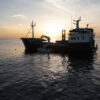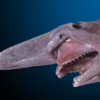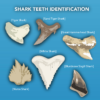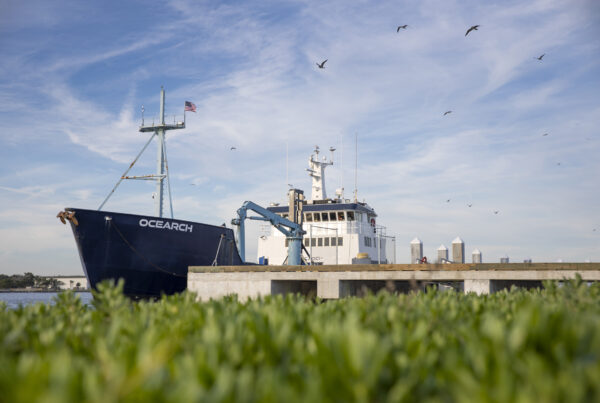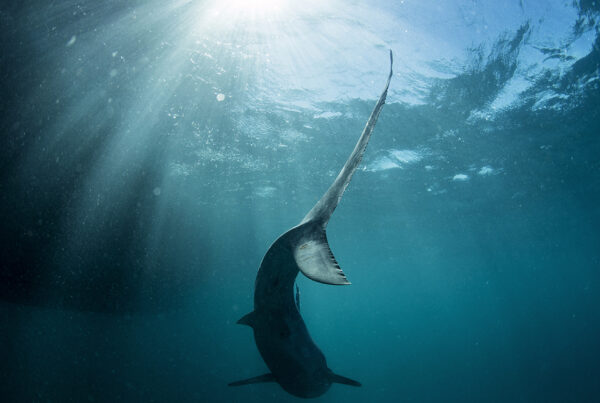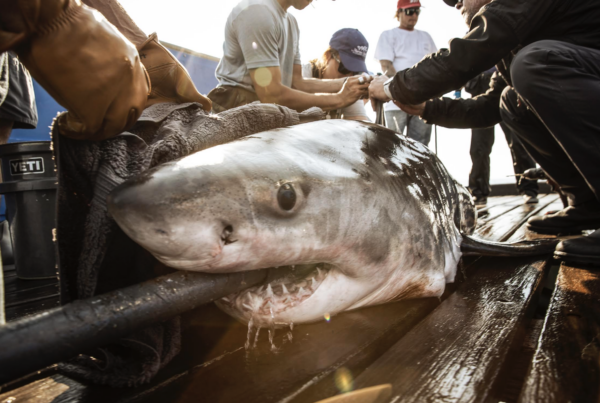Expedition Carolinas 2022
OCEARCH is returning to the waters off the Carolinas to embark on their 43rd ocean research expedition. Alongside 43 collaborators from 30 research institutions, the organization will collect data to support 25 science projects that will help finally solve, for the first time, the life history puzzle of the white shark in the Western North Atlantic Ocean.
From OCEARCH’s tracking data it is clear that the waters off the Southeast United States are an overwintering site for white sharks, and it’s during this time that we see both male and female mature sharks come together in this region before the females head offshore to possibly gestate. These mature animals will be OCEARCH’s focus during Expedition Carolinas in order to gather the fundamental data needed to solve the most elusive piece of the Western North Atlantic White Shark Puzzle: when and where they mate. Unlike other fishes, sharks mate like mammals, and it’s this critical part of their lives that OCEARCH is now closing in.
“The OCEARCH team is excited to return to the Carolinas, as we approach the end of our journey to complete our understanding of the white shark in the Western North Atlantic, from birth to old age. A last critical piece of the puzzle–when and where these sharks are mating–is within our grasp. All of our science points to the area off the Carolinas in late winter as the place where the adult females and males come together to mate, so that’s where we’re heading. With good weather and good luck, we will discover the remaining piece of the puzzle,”
– Chief Scientist Dr. Bob Hueter, OCEARCH
Locating and sampling a specific size class of an animal in a specific region is difficult and this, coupled with the tumultuous weather off the Carolinas this time of year, will make this expedition one of the biggest challenges of the study to date.
OCEARCH’s Western North Atlantic White Shark study is the most comprehensive study of white sharks in the world and includes a full health assessment of each shark, microbiological studies, movement, temperature and depth studies through the use of three different tags, and more. In order to confirm this region as a white shark mating site, blood samples will be collected to measure reproductive hormone levels. In addition, ultrasound images of the ovary and testes and semen samples from mature male animals will be assessed. Together these samples and diagnostic images will help determine if the adult white sharks present in the Carolinas region, during this season, are reproductively active.
With 83 sharks studied in the western North Atlantic ocean over the past 9 years, OCEARCH is in the last stages of their sample collection in this region. The team has just 17 sharks left to reach their goal of 100 sharks sampled and tagged in the western North Atlantic.
“As we wind down the western North Atlantic white shark life history puzzle, the challenge on the water gets even greater. Our scientists now only require mature animals out of the Southeast United States during the months of March and April. This is to solidify and nail down exactly where and when white sharks are mating. If we’re able to do so it will be the first time in history that a white shark mating site will be identified. This location will be crucial to monitor into the future as we continue to enjoy our slow and steady white shark population recovery off the eastern seaboard and Atlantic Canada, which will ultimately ensure that our great grandchildren see a thriving ocean system full of fish,” stated OCEARCH Founder and Expedition Leader Chris Fischer.
Expedition Carolinas will depart from Charleston, SC on March 4 before a final docking planned in Savannah, GA on March 24. Community outreach opportunities will be available at the beginning and end of the expedition. Explore alongside the team in real time on social media platforms @OCEARCH.
OCEARCH’s 2022 plans include an additional expedition in the western North Atlantic off of Newfoundland, Canada in July to finish up their goal of 100 sharks and officially solve the life history puzzle of the western North Atlantic white shark. The crew will then head to the waters off the United Kingdom and Ireland in order to begin to solve the life history puzzle of the white shark in the eastern North Atlantic and Mediterranean Sea.

